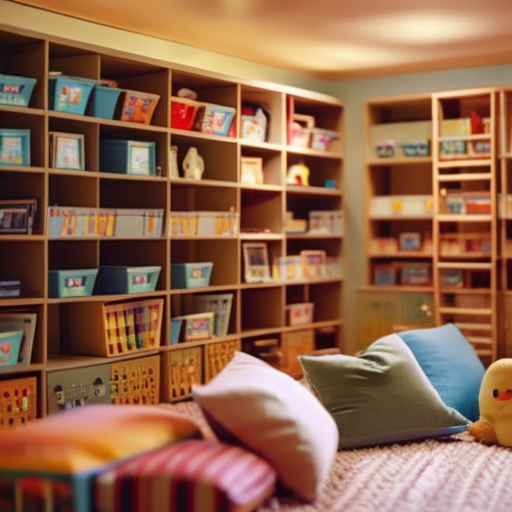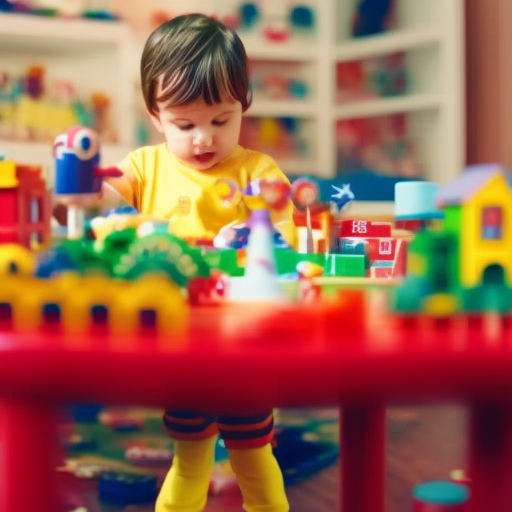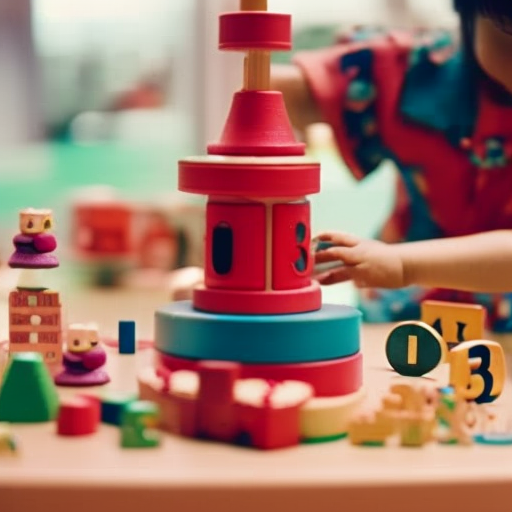"Cherishing Little Steps - A Haven for Baby and Family Journeys"
Boosting Cognitive Skills in Toddlers
Imagine a world where toddlers possess the ability to navigate complex puzzles, communicate with ease, and think critically. It may seem like a distant dream, but by implementing simple strategies, you can help boost your child’s cognitive skills and set them on a path towards lifelong learning.
In this discussion, we will explore various techniques and activities that can enhance your toddler’s cognitive development, allowing them to thrive in a world full of endless possibilities.
So, are you ready to unlock your child’s potential and witness their cognitive abilities soar to new heights?
Key Takeaways
- Play stimulates cognitive abilities and promotes problem-solving skills, creativity, and critical thinking.
- Excessive screen time can hinder cognitive development, so it is important to set limits on screen time.
- Creating a stimulating environment with sensory play areas, open-ended toys, and a print-rich environment enhances cognitive development.
- Encouraging imaginative play, reading, and interaction during playtime helps develop language skills and enhances problem-solving abilities.
The Importance of Cognitive Development

Boost your toddler’s cognitive skills and set them up for success by focusing on the importance of cognitive development. During the early years, play plays a significant role in stimulating and enhancing cognitive abilities. Engaging in various forms of play, such as pretend play, puzzles, and building blocks, helps your child develop problem-solving skills, creativity, and critical thinking abilities.
As they explore, manipulate, and interact with their environment, they’re building neural connections that are crucial for their cognitive growth.
On the other hand, excessive screen time can have a negative impact on your child’s cognitive skills. Studies have shown that excessive exposure to screens, such as television, tablets, and smartphones, can impede language development, attention span, and cognitive functioning.
It’s important to set limits on screen time and provide alternative activities that promote cognitive development, such as reading books, engaging in outdoor play, and participating in hands-on activities.
Creating a Stimulating Environment

Now, let’s explore how you can create a rich and stimulating environment that will enhance your toddler’s cognitive development. Here are three simple ways to encourage sensory exploration and hands-on learning:
-
Set up a sensory play area: Create a designated space where your toddler can engage in sensory exploration. Fill bins with materials like sand, water, or rice for them to touch and manipulate. Add various objects with different textures, colors, and shapes to stimulate their senses. This hands-on experience will help develop their cognitive skills as they learn about cause and effect, problem-solving, and spatial awareness.
-
Incorporate open-ended toys: Provide your toddler with open-ended toys that encourage imaginative play and problem-solving. Blocks, puzzles, and shape sorters are great options. These toys allow your child to use their creativity and explore different solutions. As they engage with these toys, they develop their spatial reasoning, critical thinking, and fine motor skills.
-
Create a print-rich environment: Surround your toddler with books, labels, and signs that they can interact with. Point out letters, numbers, and colors as you go about your day. Reading to your child regularly and engaging in conversations about the stories will enhance their language skills and expand their vocabulary. By fostering a print-rich environment, you’re nurturing their cognitive development and laying the foundation for future academic success.
Encouraging Imaginative Play

To foster your toddler’s creativity and cognitive development, it’s important to encourage imaginative play through various engaging activities and toys. Imaginative play allows your child to explore different roles, scenarios, and emotions, helping them develop important cognitive skills. Here are some imaginative play ideas to get you started:
-
Dress-up: Provide a box of costumes and accessories, allowing your toddler to transform into their favorite characters. This encourages imaginative storytelling and role-playing.
-
Pretend Kitchen: Set up a play kitchen with pots, pans, and plastic food. Your child can play chef, cook up imaginary meals, and practice sharing and taking turns.
-
Building Blocks: Build towers, houses, or even an entire city using building blocks. This helps develop spatial awareness, problem-solving skills, and creativity.
-
Puppet Show: Create a puppet theater using a cardboard box and puppets. Your toddler can put on their own show, fostering language development, storytelling, and social skills.
-
Outdoor Adventures: Encourage your child to use their imagination while playing outside. They can pretend to be explorers, pirates, or even superheroes, promoting physical activity and creativity.
Benefits of imaginative play include enhanced language and communication skills, improved problem-solving abilities, and increased social and emotional development.
Developing Language Skills

Encouraging imaginative play not only fosters creativity, but it also sets the foundation for developing important language skills in toddlers. Language development is a crucial aspect of a child’s overall growth and plays a significant role in their ability to communicate effectively.
Here are three ways in which imaginative play can enhance language skills and expand vocabulary in toddlers:
-
Storytelling: Engaging in pretend play allows toddlers to create and narrate their own stories. This helps them practice forming sentences, using descriptive words, and expressing their thoughts and emotions. As they immerse themselves in imaginative scenarios, their vocabulary expands naturally.
-
Role-playing: Acting out different roles and scenarios during playtime enables toddlers to practice using words and phrases they’ve heard in real-life situations. Whether they pretend to be a doctor, a teacher, or a chef, they learn new vocabulary related to those roles and reinforce their understanding of language concepts.
-
Language-rich Environment: Imaginative play often involves interaction with peers or caregivers. These social interactions provide toddlers with opportunities to engage in conversations, ask questions, and learn from others. Being exposed to a language-rich environment helps them absorb new words and phrases, improving their language skills.
Enhancing Problem-Solving Abilities

Engaging in imaginative play can provide toddlers with valuable opportunities to enhance their problem-solving abilities. Through play, children are encouraged to think critically and use logical reasoning to solve problems that arise during their imaginative adventures.
During imaginative play, toddlers often encounter obstacles or challenges that require them to think creatively and come up with solutions. For example, they may need to figure out how to build a bridge across a pretend river or find a way to rescue their stuffed animal from a pretend trap. These situations require them to think critically, analyze the problem, and use logical reasoning to come up with a solution.
By engaging in imaginative play, toddlers learn to think outside the box and explore different possibilities. They develop the ability to think critically, evaluate different options, and make informed decisions. These problem-solving skills are invaluable in everyday life and will continue to benefit them as they grow older.
Encouraging imaginative play can be as simple as providing open-ended toys, such as blocks or dress-up clothes, and giving your child the freedom to explore and create their own scenarios. You can also join in the play and provide opportunities for problem-solving by introducing new challenges or asking open-ended questions.
Introducing Math Concepts

Introducing math concepts to toddlers can lay a solid foundation for their future mathematical skills. Early numeracy skills are crucial for a child’s overall development, and it’s never too early to start. Here are three ways you can introduce math concepts to your little one through hands-on learning:
-
Counting and Sorting:
Encourage your toddler to count their toys or objects around them. You can also introduce the concept of sorting by grouping objects based on their attributes, such as color or size. This activity not only helps them understand numbers but also develops their problem-solving skills. -
Shape Recognition:
Help your child identify and name different shapes in their environment. You can play games like ‘I Spy’ where you ask them to find objects of a specific shape. This activity promotes visual discrimination and enhances their spatial awareness. -
Number Recognition:
Introduce numerals by using flashcards or number puzzles. Make it fun by incorporating their favorite characters or toys. As they become familiar with numbers, you can gradually introduce basic addition and subtraction concepts.
Remember to keep the activities age-appropriate and engaging. By incorporating early numeracy skills into their playtime, you’re setting them up for future mathematical success.
Fostering Memory and Recall
To enhance your toddler’s memory and recall skills, incorporate interactive activities that stimulate their cognitive abilities. Improving attention span is crucial for memory development, and there are various memory games you can play with your little one to achieve this.
One simple game is the classic ‘Memory Match.’ Lay out a set of cards face down and take turns flipping them over to find matching pairs. This game not only strengthens memory skills but also promotes focus and concentration.
Another fun activity is storytelling. Encourage your toddler to recall events from their day or retell a favorite story. This exercise stimulates both short-term and long-term memory while fostering language development.
You can also engage in sensory activities, like a ‘Mystery Box.’ Fill a box with objects of different textures and shapes, and have your child reach in to feel and guess what’s inside. This game enhances tactile memory and encourages active recall.
Lastly, incorporating music and movement can boost memory skills. Singing songs with repetitive lyrics and actions helps toddlers remember and recall information more effectively.
Promoting Fine Motor Skills

To support the development of your toddler’s fine motor skills, provide opportunities for them to practice using their hands and fingers in various activities. Here are three engaging and intimate ways you can promote their fine motor skills:
-
Finger painting: Set up a safe and messy play area with non-toxic finger paints and large sheets of paper. Encourage your toddler to explore and create using their fingers. This activity helps them develop hand-eye coordination and control over their finger movements.
-
Building blocks: Give your toddler a set of building blocks and watch their creativity flourish. As they stack and manipulate the blocks, they enhance their dexterity and finger strength. This activity also strengthens their problem-solving skills and spatial awareness.
-
Playdough play: Provide your toddler with colorful and pliable playdough. They can squeeze, roll, and mold it into different shapes, strengthening their hand muscles and refining their finger movements. This sensory activity improves their tactile perception and fine motor control.
Boosting Attention and Focus
As your toddler hones their fine motor skills through activities like finger painting, building blocks, and playdough play, they also begin to develop the foundational skills necessary for boosting attention and focus. Improving concentration and building self-control are crucial aspects of cognitive development in toddlers.
One effective way to improve your toddler’s attention and focus is through engaging activities that require sustained attention. For instance, you can introduce puzzles and matching games that require them to focus on finding the right pieces or objects. Encourage them to complete tasks without getting distracted, gradually increasing the difficulty level as they become more proficient.
Another strategy is to establish a routine that includes regular periods of focused play or learning. By setting aside specific times for activities that require attention, such as reading books or doing simple crafts, you can help your toddler develop the habit of concentrating on a task for an extended period. Remember to keep these activities age-appropriate and enjoyable to maintain their interest and engagement.
Additionally, providing a calm and organized environment can also contribute to improved concentration. Minimize distractions and create a designated space for your toddler’s activities. This will help them stay focused and avoid getting overwhelmed.
Building self-control is equally important for attention and focus. Encourage your toddler to practice patience and delay gratification. For example, teach them to take turns during playtime or wait for their turn to speak during conversations. These small exercises in self-control will gradually strengthen their ability to stay focused and attentive.
Incorporating Music and Movement

Incorporating music and movement into your toddler’s daily routine can be a fun and effective way to boost their cognitive skills. Not only does it engage their senses and stimulate their brain, but it also promotes physical development and emotional well-being.
Here are three music and movement activities that can provide sensory play for toddlers:
-
Dance Party: Turn up the music and have a dance party with your little one! Encourage them to move their body to the rhythm of the music. Dancing helps improve coordination, balance, and spatial awareness. It also enhances their ability to listen and follow instructions.
-
Musical Instruments: Introduce your toddler to various musical instruments. Let them explore and experiment with different sounds. Playing instruments helps develop fine motor skills, hand-eye coordination, and auditory discrimination. It also encourages creativity and self-expression.
-
Singing and Rhyming: Singing songs and reciting rhymes with your toddler can enhance their language skills and phonemic awareness. It helps them recognize patterns, rhythms, and sounds. Singing also promotes bonding and emotional connection between you and your child.
Frequently Asked Questions
What Are Some Recommended Activities to Enhance Problem-Solving Abilities in Toddlers?
Want to boost your toddler’s problem-solving abilities? Engage them in recommended activities that challenge their thinking. Encourage puzzles, sorting games, and building blocks. Watch as their problem-solving skills soar!
How Can Parents Incorporate Math Concepts Into Their Toddler’s Daily Routine?
To incorporate math concepts into your toddler’s daily routine, start by making numbers and counting a natural part of their environment. Point out numbers on signs, count objects during playtime, and talk about quantities during mealtime. Early exposure to numbers and counting will boost their cognitive skills.
Are There Any Specific Techniques to Foster Memory and Recall in Toddlers?
You can boost your toddler’s memory and recall skills by using specific techniques. Try engaging activities like memory games or storytelling to enhance their memory retention. Encourage problem-solving abilities through puzzles and age-appropriate challenges.
What Are Some Effective Ways to Boost Attention and Focus in Young Children?
To boost attention and focus in young children, engage them in activities that improve fine motor skills like puzzles and drawing. Additionally, promote their social emotional development by encouraging empathy, sharing, and positive relationships.
How Can Parents Incorporate Music and Movement to Enhance Cognitive Skills in Toddlers?
You won’t believe the magic of music and movement in boosting your toddler’s brainpower! Incorporating music therapy benefits their cognitive skills, while physical activity enhances their learning and development. Let’s dance and sing our way to brilliance!
Conclusion
Congratulations on taking the first steps to boost your toddler’s cognitive skills!
By creating a stimulating environment, encouraging imaginative play, and developing their language skills, you’re setting the stage for their future success.
Remember, fostering memory and recall, promoting fine motor skills, and boosting attention and focus are all essential for their growth.
Don’t forget to incorporate music and movement to keep your little one engaged and excited on this incredible journey of cognitive development.
Keep up the great work!



I loved you even more than you’ll say here. The picture is nice and your writing is stylish, but you read it quickly. I think you should give it another chance soon. I’ll likely do that again and again if you keep this walk safe.
Thank you for your sharing. I am worried that I lack creative ideas. It is your article that makes me full of hope. Thank you. But, I have a question, can you help me?